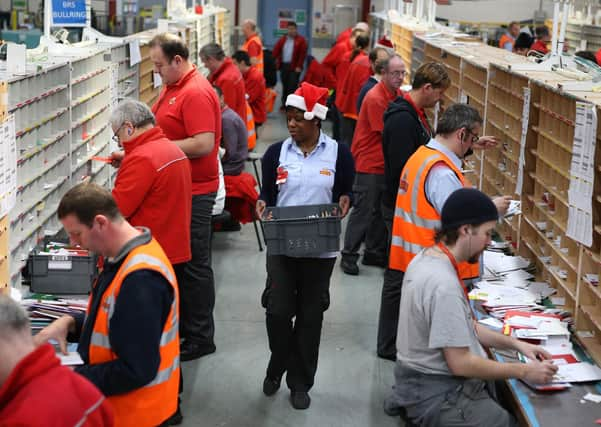Rush for seasonal workers on top of existing worker shortage caused by Brexit and Covid


Royal Mail has launched a drive to take on 500 temporary Christmas workers as the Department for the Economy (DfE) confirms how employers are struggling to fill vacancies.
Sainsbury’s is also adding 22,000 Christmas workers across the UK, and Amazon 20,000 - with both hiring a proportion in NI. Marks and Spencers has also confirmed that, as usual, it will be hiring temporary staff for every store across Northern Ireland.
Advertisement
Hide AdAdvertisement
Hide AdBut a DfE spokeswoman confirmed that there is already a “general tightening in the labour market with shortages in a number of sectors”.
Online job adverts in Northern Ireland were at an all-time high in August 2021, at 52% above their normal monthly tally, she added.
The spokeswoman said that there are already staffing shortages of up to 35% for some food processing-critical occupations. The number of migrant workers in the sector had roughly halved last year compared to the year before - down from 20.6% in 2019 to 10.7% in 2020.
“This is clearly a significant decrease that officials will continue to monitor,” the DfE spokeswoman added.
Advertisement
Hide AdAdvertisement
Hide AdRepresentatives for the pig farming and slaughtering sectors have recently warned the News Letter that they are facing an existential threat in NI due to the shortage of mainly migrant workers.
The DfE also noted there is a shortage of up to 5000 drivers - including HGV drivers - in NI, though it added that GB, France, Germany and Poland are all facing much larger shortages.
Ulster University Senior Economist Dr Esmond Birnie said this year the UK saw an increase of 75% in vacancies for accommodation and food service staff and similar levels for in transportation, including HGV drivers.
“And it has been clear for some time that meat processing plants in NI and care homes have been heavily dependent on migrant workers from the EU,” he added.
Advertisement
Hide AdAdvertisement
Hide AdAfter Brexit some migrant workers did not want to stay in the UK and some returned to be with their families during lockdown, he said. In addition, the economies of some central-eastern European economies have been growing quite rapidly so their own labour markets are becoming more attractive, especially in Poland, he added.
However it “too early to say” if the dynamics will push the UK towards a ‘high wage economy’, as predicted recently by Boris Johnson, he added.
In response to labour shortages across so many sectors, the Department for Economy said yesterday that it continues to engage with industry and the UK Government to ensure that its immigration policy for migrant workers reflects the needs of NI’s economy. Last week 17% of GB adults were not able to purchase some essential food, due to a shortage of HGV drivers caused by Brexit. There have also been disruptions to forecourt fuel deliveries in GB, also caused by a shortage of HGV drivers and panic buying. NI’s latest unemployment figure is only 4%, compared to peaks of around 13% in the mid-1990s and 8% around 2013.